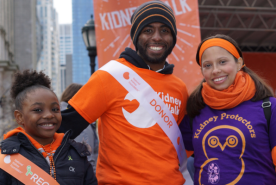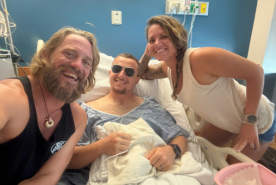Blood type compatibility is crucial for kidney transplants. Paired exchange programs help if blood types don't match by facilitating swaps between donor-recipient pairs.
What blood types "match"?
Blood typing is the first blood test that will determine if your blood is compatible with the potential donor's blood. If the donor's blood type works with your blood type, the donor will take the next blood test (tissue typing).
Kidney donors must have a compatible blood type with the recipient. The Rh factor (+ or -) of blood does not matter in a transplant.
The following blood types are compatible:
- Donors with blood type A… can donate to recipients with blood types A and AB
- Donors with blood type B… can donate to recipients with blood types B and AB
- Donors with blood type AB… can donate to recipients with blood type AB only
- Donors with blood type O… can donate to recipients with blood types A, B, AB and O (O is the universal donor: donors with O blood are compatible with any other blood type)
So,
- Recipients with blood type O… can receive a kidney from blood type O only
- Recipients with blood type A… can receive a kidney from blood types A and O
- Recipients with blood type B… can receive a kidney from blood types B and O
- Recipients with blood type AB… can receive a kidney from blood types A, B, AB and O (AB is the universal recipient: recipients with AB blood are compatible with any other blood type)
What if me and my donor are not a match?
If blood types are not compatible, the donor will not be able to donate directly to you. However, the donor may consider donating through a paired exchange program. Paired exchange programs allow you to get a kidney from another donor who is not a match for their intended recipient. Paired exchange involves two living donors and two recipients. If the recipient from one pair is compatible with the donor from the other pair, and vice versa– the transplant center may arrange for a "swap"–for two simultaneous transplants to take place. This allows two transplant candidates to receive organs and two donors to give organs though the original recipient/donor pairs were unable to do so with each other.

Both donors and candidates are carefully evaluated and tested medically and psychologically to assure that the benefits outweigh the risks. It is important for both surgeries to be scheduled for the same time in case either donor changes their mind at the time of surgery. Surgeries can take place at the same or different hospitals. It can be advantageous if the surgeries take place at the same hospital though this may mean extra costs of travel and housing for one couple.
Where can I find more information on paired exchange programs?
If you are interested in a paired exchange program:
- Talk with your transplant hospital. If you're already working with a transplant hospital: Talk to them about your options. Ask them if any of these programs are an option for your situation, and if so, does that hospital offer them?
- If not: contact transplant hospitals (in the recipient's area) to ask. Find a transplant center in your area on the Organ Procurement and Transplantation Network (OPTN) site. Select "Transplant Centers by Organ," then select "Kidney," and then select your state.
- Contact a transplant hospital that has an exchange program. It's always a good idea to check with your transplant hospital, or hospitals nearby.
- Contact other organizations which might help. Following are links to other organizations which help to facilitate exchanges. PLEASE NOTE: these organizations and their websites are not under the control of the NKF, and NKF assumes no responsibility for their content or services. These links are provided for information purposes only, and should not be considered an endorsement or recommendation by the National Kidney Foundation.
- OPTN/UNOS Kidney Paired Donation Program The vision of the OPTN/UNOS Kidney Paired Donation Program is that every kidney transplant candidate with an incompatible but willing and approved living donor receives a living donor kidney transplant. The mission is to develop a successful Kidney Paired Donation (KPD) program with universal access to all UNOS/OPTN members that prioritizes the medical and psychosocial safety of living donors and candidates.
- Alliance for Paired Donation The mission of the Alliance for Paired Donation™ is to save lives by significantly reducing the wait time for a kidney transplant through kidney paired donation.
- National Kidney Registry The mission of the National Kidney Registry is to save and improve the lives of people facing kidney failure by increasing the quality, speed, and number of living donor transplants in the world.


















